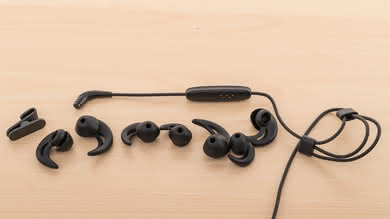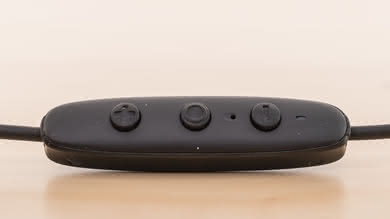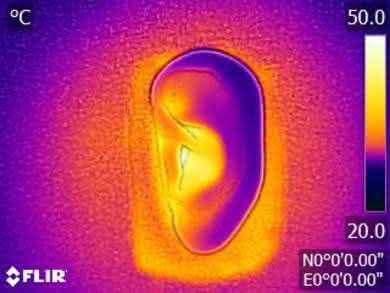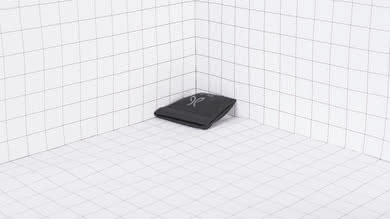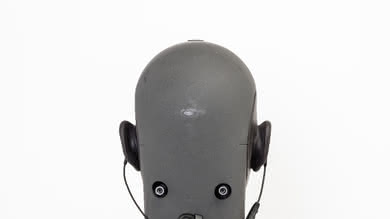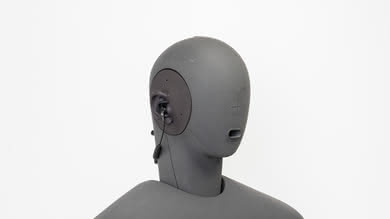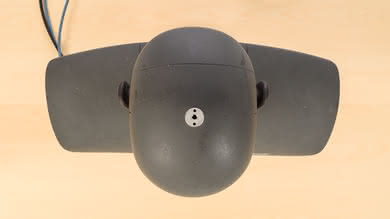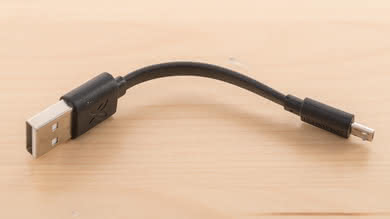The Jaybird Freedom 2 Wireless 2017 are decent mixed usage sports headphones with a few more convenient design tweaks than the original Jaybird Freedom F5 Wireless 2016. They have the same build quality as the older model but are a bit more comfortable and adjustable thanks to their new earbud-like tips and cable management clip. They're stable in-ears for sports and block enough noise to be suitable for commuting. They also barely leak, which is good for noise-sensitive environments like the office. Unfortunately, they have the same battery performance and bulky charging clip as the original Freedom, which is a bit disappointing.
Our Verdict
The Jaybird Freedom 2 are decent for mixed usage. They have a sleek wireless in-ear design that's stable enough for working out and most sports. They also block enough noise to use on your daily commutes. They also do not leak much, which makes them an above-average option for the office. Unfortunately, they're not as sturdy as some of the other Jaybird models, and they have a relatively short battery life, and a bulky, cumbersome charging clip makes them a bit unstable when attached.
-
Above-average passive noise isolation.
-
Minimal leakage.
-
Stable and portable design.
-
Charging clip is bulky and inconvenient.
-
Short battery life.
The Jaybird Freedom 2 are average for neutral listening. They have a decent audio reproduction with good but slightly overpowering bass that makes them sound a bit boomy. The slightly recessed mid-range and inconsistent treble also makes instruments and vocals sound a bit distant and lacking in clarity. However, due to their closed-back in-ear/earbud design, they have a poor soundstage, which won't be ideal for more neutral listeners. On the upside, their overall sound quality is good enough for most, and they come with a good parametric EQ so you can reduce a bit of the bass if it's too much for you.
The Jaybird Freedom 2 are above-average for commuting. They're portable and passively isolate better than some noise cancelling headphones. They also have easy to use controls and will easily fit into most pockets. Unfortunately, their charging clip is a bit cumbersome and limiting. If you forget the clip at home or lose it while commuting, then you won't be able to charge the headphones.
The Jaybird Freedom 2 are good headphones for sports. They have a lightweight and portable design that's easy to have on you at all times. They're comfortable, easy to use, and stable enough to workout with. Unfortunately, if you attach the bulky charging clip on the in-line remote, it will make them less stable and pulls on the right earbud, which might slip out of your ear during more intense workouts.
The Jaybird Freedom 2 are above-average for office use. They isolate noise well and barely leak. This makes them suitable to use in a lively or quiet office environment. Their battery life is relatively short, but on the upside, you can use them while they're charging.
The Jaybird Freedom 2 are below-average for gaming. They have a mediocre microphone and a bit too much latency to be suitable for gaming.
- 7.0 Mixed Usage
- 6.5 Neutral Sound
- 7.5 Commute/Travel
- 7.9 Sports/Fitness
- 6.9 Office
- 5.5 Wireless Gaming
- 5.4 Wired Gaming
- 6.4 Phone Call
- Updated Nov 21, 2019: Converted to Test Bench 1.3.1.
- Updated Nov 21, 2019: Converted to Test Bench 1.3.
- Updated Aug 08, 2018: Review published.
- Updated Aug 06, 2018: Our testers have started testing this product.
- Updated Aug 06, 2018: Early access published.
- Updated Aug 04, 2018: The product has arrived in our lab, and our testers will start evaluating it soon.
- Updated Jul 26, 2018: We've purchased the product and are waiting for it to arrive in our lab.
Compared To Other Headphones

The Jaybird Freedom 2 are decent mixed usage sports headphones. They're fairly similar to the original Jaybird Freedom F5 Wireless 2016, only slightly changing the provided tips, which are now a bit more comfortable and closer in shape to earbuds than in-ears. They also have a new cable management clip and design that you can't remove but does make Freedom 2 a bit easier to adjust for different head sizes than the original. Overall, they're a lightweight and comfortable wireless in-ear with a good wireless range, a decent build quality, and a customizable sound.
Unfortunately, their charging clip is just as limiting as on the original, and if you lose it, you won't be able to charge your headphones. See our recommendations for the best closed-back headphones, the best cheap earbuds, and the best earbuds.
The Jaybird Freedom 2 Wireless 2017 are very close in performance to the Jaybird Freedom F5 Wireless 2016. They have the same overall design and build quality. The Freedom 2 have a slightly more comfortable earbud-like fit than the originals, and they also have better cable management. On the upside, the regular Freedom have a slightly better sound quality out-of-the-box and a more isolating in-ear fit, although both headphones can be easily EQed with the MySound app. They also both come with the same bulky charging clip that's a bit limiting and will prevent you from being able to charge your headphones if lost or damaged.
The Jaybird X3 are a slightly better wireless headphone than the Jaybird Freedom 2 Wireless 2017. The X3 have a slightly better build quality, stronger isolation against ambient noise, and a longer more practical battery life for everyday use. The Freedom 2, on the other hand, have a more comfortable earbud hybrid fit that most will prefer over that of the X3. The Freedom also have a more portable design when the charging clip is not attached. On the upside, both headphones benefit from the same customizable app and they're both great headphones for sports.
The Jaybird X4 Wireless are better in-ears than the Jaybird Freedom 2 Wireless 2017. They have better sound quality, a longer battery life, better leakage performance, better build quality, and are rated IPX7. On the other side, the Jaybird Freedom 2 are more comfortable, which can be the most important factor for some people.
The Jaybird Tarah Wireless are better headphones than the Jaybird Freedom 2 Wireless 2017 in most respects. The Tarah have a better-balanced sound profile, longer continuous battery life, leak less audio, and a longer wireless range. They're also rated IPX7 for water resistance. On the other hand, the Freedom 2 are more comfortable.
The Jaybird Run Truly Wireless are slightly better headphones for sports than the Jaybird Freedom 2 Wireless 2017. The Run are truly wireless headphones that are a lot more compact than the Freedom once out of their case. They also have a longer battery life overall, although they do not last quite as long on a single charge. The Freedom, on the other hand, have easier to use controls, better range, and a slightly more comfortable earbud-like fit. On the upside, both headphones are customizable thanks to the MySound app, and both headphones would be a good choice for sports.
The Jaybird Freedom 2 Wireless 2017 are a slightly better headphone overall than the Bose SoundSport Wireless. The Freedom have a better isolating fit which is more suitable for commuting and loud environments. They also have a customizable sound and easier to use controls. The Bose, however, are a bit more compact when not in their bulky charring case. They also have a better-balanced sound quality that may not even need an EQ on most tracks. They have a longer battery life overall, and a more typical earbud fit that some will prefer over that of the Freedom 2.
The Jaybird Freedom 2 are a slightly better wireless in-ear than the JBL Endurance Sprint. The Jaybirds have a smaller form factor that will more easily fit into pockets, which makes them a bit easier to carry around on your person. They also have a more comfortable semi earbud fit that most will prefer over that of the Endurance Sprint and they have a customizable sound that you can easily EQ with the Jaybird MySound app. The JBL, on the other hand, have a slightly more rugged look and feel and deliver better noise isolation and lower leakage thanks to their in-ear fit. They also have a slightly more stable ear hook design for sports, but the earbuds do not stay in your ears as well as the Jaybird.
The Jaybird Freedom 2 are much better sports headphones than the Sony WI-SP500. The Jaybirds have a better, more consistent sound quality that you can also customize via their app. They isolate better in noisy conditions, and their semi earbud fit is more comfortable and stable than that of the Sony. On the other hand, the SP500 last a longer on a single charge at seven hours compared to four, although the Jaybird do come with an additional four hours stored in the charging clip. The Sonys can also pair via NFC, which makes them slightly easier to connect to mobile devices.
The Jaybird Freedom 2 Wireless 2017 are better and more versatile headphones than the AfterShokz Trekz Air Bone Conduction. The Jaybird are more portable, and since they are closed-back in-ears, they isolate ambient noise and don’t leak much. However, the AfterShokz are designed for runners and cyclists who want to hear what’s going on around them. With their bone-conducting design, the AfterShokz have a better soundstage and act more like background music while you train. They also have better battery life than the Jaybird.
Test Results
The Jaybird Freedom 2 are almost identical to the original Jaybird Freedom F5 Wireless 2016 except for the new cable management clip that makes their design a bit more adjustable for different head shapes and sizes. They also come with slightly better earbud-like tips that are more comfortable. However, apart from these minor changes, the rest of the design and build quality is pretty much identical to the older model. They have the same sleek earbud design that's a lot smaller than the Jaybird X3 Wireless and most of the wireless in-ears we've tested, but their charging clip is bulky and cumbersome. They don't come in as many flashy color schemes as most sports headphones, but their subtle dark color scheme will work for most. They also come in a white and gold color variant if you want them to stick out a bit more.
The Jaybird Freedom 2 are slightly more comfortable than the original Jaybird Freedom F5 Wireless 2016 and the Jaybird Tarah Wireless. They come with a different set of tips that feel like a cross between a typical in-ear design and earbuds. This means they do not quite go as deeply into your ear canal as the original Freedom, which most will prefer, but they're also not quite as comfortable as some of the Bose earbuds we've tested. On the upside, they won't cause any soreness or fatigue, even after hours of listening, and they're a good fit for fans of in-ears and earbuds alike.
The Jaybird Freedom 2's control scheme is efficient and straightforward. They provide the essential functions; call/music, track skipping, and volume controls. The in-line remote isn't as wide or as responsive as that of the Jaybird X3 Wireless, but it's simple and easy-to-use. The buttons provide slightly more feedback than the original, but it's not very noticeable.
The Jaybird Freedom 2, like most earbuds and in-ears, are very breathable headphones. The redesign of the tips makes them feel a bit more like earbuds which will trap slightly more heat within the notch of your ear when compared to the original Jaybird Freedom F5 Wireless 2016 without the stabilizing fins. But on the upside, it's a negligible temperature difference that will not be noticeable under most circumstances, even during more intense physical activity.
The Jaybird Freedom 2 have a very similar size and design as the original Jaybird Freedom F5 Wireless 2016. They have a slightly longer cable, and the new cable management clip does make them slightly bulkier, but not by much. They're still very portable headphones and compact enough to fit into almost any pocket. Unfortunately, if you include the charging accessory, they become less portable, but you most likely won't keep the charging clip attached when using them outdoors.
The Jaybird Freedom 2 come with a carrying pouch that will protect the headphones from scratches and minor water exposure. However, unlike the Jaybird X2 Wireless, it's not a solid case, so it won't shield your headphones against impacts or drops. On the upside, this pouch doesn't add much bulk to the headphones, which makes it easy to carry on you at all times.
The Jaybird Freedom 2 are decently well-built and with the same base design and build quality of the original Jaybird Freedom F5 Wireless 2016. The earbuds are lightweight and made of a tough plastic that won't easily break even after multiple drops. The in-line remote is decent but feels a bit cheap when compared to the Jaybird X2 Wireless or the Jaybird X3 Wireless. This cable is a bit longer and the in-line remote buttons a tad more responsive, but build quality-wise they're essentially the same, once you remove the new earbud-like tips and cable management clips.
The Jaybird Freedom 2 are quite stable. They're lightweight, wireless, and don't move much once in your ear. They have a new set of tips that already has the stability fins attached which makes them a bit easier to get the right fit. They're also more stable than the original Jaybird Freedom F5 Wireless 2016 if you do not attach the stability fins which may happen occasionally since they aren't one unit like on the originals. They also have better cable management out of the box, but you have to adjust it just right for your head size or the cable will tug a little on the earbuds which might pull them out during more strenuous exercises and workout routines.
The frequency response consistency is excellent. If the user can achieve a proper fit and an air-tight seal using the assortment of tips that come with the headphones, then they should be able to get consistent bass and treble delivery every time they use the headphones.
The bass is above-average. LFE (low-frequency extension) is at 10Hz. The response throughout the range is flat and even but consistently over our neutral target by 5dB. This means the bass is deep, punchy, and quite heavy, which may be pleasing to the fans of heavy bass. However, it won't be neutral and balanced and could overpower the vocals and lead instruments.
The mid-range of the Jaybird Freedom 2 is decent. The response throughout the range is very even, but the wide 5dB recess centered around 700Hz pushes the vocals and lead instruments towards the back of the mix. Also, the subtle underemphasis in high-mid has a small but negative effect on the intensity and projection of instruments in the mix.
The treble response of the Jaybird Freedom 2 is decent. Low-treble is underemphasized by 3.5dB due to the dip centered around 4KHz. This negatively affects the detail and articulation of vocals and lead instruments. However, the peaks in mid-treble around 6KHz and 10KHz could make the S and Ts (sibilances) a bit sharp and piercing. This will be mostly noticeable on vocals and cymbals.
The stereo imaging of the Jaybird Freedom 2 is great. Their weighted group delay is well below our audibility threshold, resulting in a tight bass and a transparent treble reproduction. Also, the L/R drivers of our test unit were very well-matched in frequency, amplitude, and phase response. This is important for accurate placement and localization of objects, such as footsteps and instruments, in the stereo field.
The soundstage is poor. This is because creating an out-of-head and speaker-like soundstage is largely dependent on activating the resonances of the pinna (outer ear). The design of in-ears and earbuds is in such a way that fully bypasses the pinna and doesn't interact with it. Also, because these headphones have a closed-back enclosure, their soundstage won't be perceived to be as open as that of open-back earbuds like the Apple AirPods (1st generation) Truly Wireless, Google Pixel Buds 2017 Truly Wireless, or the Bose SoundSport Free Truly Wireless.
The isolation performance is decent. In the bass range, where the rumble of airplane and bus engines sits, they achieved almost 7dB of isolation which is about average. In the mid-range, important for blocking out speech, they reduce outside noise by more than 20dB, which is very good. In the treble range, occupied by sharp S and T sounds, they isolate by more than 38dB, which is great. Compared to the original Jaybird Freedom F5 Wireless 2016, the Jaybird Freedom 2 perform slightly worse in the bass and treble ranges, probably due to their more earbud-like design. However, the difference won't be noticeable to most.
The leakage performance is great. These in-ears do not leak in the bass and mid-ranges, and their leakage is concentrated in the treble range. Therefore, their leakage will be thin and sharp sounding. The overall level of the leakage is quiet too. With the music at 100dB SPL, the leakage at 1 foot away averages at 28dB SPL and peaks at 44dB SPL, which is noticeably quieter than the noise floor of an average office.
The in-line microphone of the Jaybird Freedom 2 is mediocre-at-best. In quiet environments, speech recorded or transmitted with this mic will sound relatively thin, noticeably muffled, and lacking in detail. In noisy situations, they will struggle to separate speech from ambient noise, even in moderately loud environments such as a busy street.
The Jaybird Freedom 2's microphone has a sub-par recording quality. The LFE (low-frequency extension) of 486Hz means speech recorded/transmitted with this mic will sound relatively thin. The HFE (high-frequency extension) of 3.2kHz results in a speech that is muffled and lacks quite a bit of detail. However, speech will still be quite intelligible since speech comprehensibility is mostly dependent on the 500Hz-4Khz range. The response between the LFE and HFE points is decent.
The in-line microphone is mediocre at noise handling. In our SpNR test, it achieved a speech-to-noise ratio of 14dB, indicating that they're best suited for quiet environments. But they won't be ideal for moderate and loud environments, as they will have difficulty fully separating speech from ambient noise.
The Jaybird Freedom 2 have a 4-hour battery life just like the original Jaybird Freedom F5 Wireless 2016. They charge relatively fast, at 1.4 hours and the charging clip adds another four hours to the battery life, which should last you about a day's worth of use if you take breaks or keep the charging clip attached. Unfortunately, they do not automatically turn off to save power, which means the battery will continue to drain as long as they're paired to a device even when inactive.
Update 08/03/2019: We've updated the app score of the Jaybird MySound app to reflect the customization level of their Equalizer. Unlike most phone apps, they have a parametric EQ compared to a typical 5-band graphic one like on the Jabra Elite 65t Truly Wireless.
Jaybird MySound is a well-designed and community-oriented app that lets you share presets and EQs with other Jaybird Freedom 2 users. It also has an excellent parametric equalizer that lets you customize the sound profile. While the app lacks some additional features, like room effects or hear-through modes, overall, it feels useful and well made. They also display battery data directly in your notification tab, which is a nice touch.
The Jaybird Freedom 2 do not support NFC, but they're fairly easy to pair with most Bluetooth devices and have multi-point pairing, so you can easily switch between Bluetooth sources once connected.
These headphones have quite a bit of latency, which will be noticeable when watching videos. It's not more than most typical Bluetooth headphones, but it won't be ideal for gaming and watching movies.
The Jaybird Freedom 2 have no wired option. If you want a good sounding wired in-ear, then check the 1More Triple Driver.
These headphones don't have a dock. If you want headphones that are versatile and have a dock, try the SteelSeries Arctis 7 Wireless 2017. However, they won't be as portable or as suitable for sports as the Jaybird Freedom 2.


